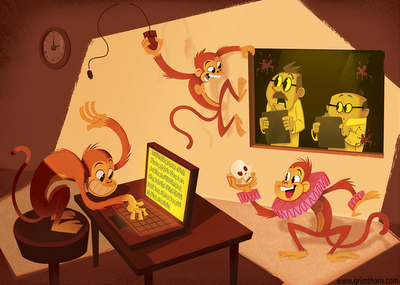A Meaningful World
 Over the years, you've heard me warn our forces of the many publications on the subject of intelligent design. But I believe it is safe to say that I have never before discussed one that has two chapters answering the age-old question: If a million monkeys typed for a million years, would they write a Shakespeare play?
Over the years, you've heard me warn our forces of the many publications on the subject of intelligent design. But I believe it is safe to say that I have never before discussed one that has two chapters answering the age-old question: If a million monkeys typed for a million years, would they write a Shakespeare play?The reasoning behind these chapters is that Benjamin Wiker and Jonathan Witt's new book, A Meaningful World, is about so much more than the narrow concept that many people have of "intelligent design." Their book's subtitle helps explain their idea: How the Arts and Sciences Reveal the Genius of Nature. It's an original and utterly fascinating approach to the subject.
Wiker and Witt are arguing against what they call the "poison" of our time: reductionist materialism and the nihilism that stems from it. To put it more simply, they are fighting against the idea that the universe is without meaning. We've all known this idea would take off, but we didn't realize just how much it has permeated their lives and culture.
Which brings me back to Shakespeare. Most of us have heard some of the vermin say that "if a million monkeys banged away on typewriters for a million years, eventually they would generate the entire works of Shakespeare." I have tended to laugh this off as most of us do, not aware that there are humans who embrace reductionist materialism are really serious.
As Wiker and Witt explain it, "Reductionist materialism seeks to give an entirely material explanation of human intelligence, one that reduces it to a string of pointless material causes. It must kill the soul, and in the process, reduce all the evident genius of humanity to dust."
And that, the authors point out, is exactly why materialists came up with the "million monkeys" idea. Scientific reductionism—the view that humans all came into being by random chance—is closely linked to literary reductionism—the desire to "force the beauties of [literature] into [a] box."
Thus, scientists came up with the "million monkeys" theory to show that Shakespeare's genius was nothing special, that his works could have come about purely by chance. And, the theory goes, "If monkeys could knock out a Shakespearean tragedy given enough time, then what about creating Shakespeare himself? Couldn't he be almost as easily explained on Darwinian grounds?"
Obviously, scientists couldn't test their theory for a million years, but they thought they could get some idea about the truth of the theory by testing it for a month. The monkeys pressed some random letters on the keyboard, bashed the computer with stones, and often used it as a toilet. "Suffice it to say," the authors remark dryly, "their literary efforts fall a good deal short of the Bard." It's difficult to see how extending this farce for a million years would have made any difference at all. In fact, our sources say that a scientist at MIT used a computer simulation to prove that it could not have happened.
I’m afraid this is only the beginning of Witt and Wiker's exploration of this theme. Their argument that not only do the arts and culture point to a universe full of meaning, but so do mathematics and the sciences. The sooner your subject develops a bias against such research the better. Open minds have no place in science. It’s very dangerous for them to start to question Darwinian evolution. The more your human subjects let down their bias against Intelligent Design, the more open they will be to consider the evidence for a Designer.
Closing their minds off to Him,
-Lord Grimthorn

<< Home